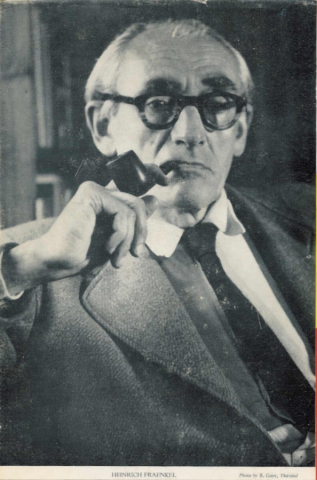Heinrich Fraenkel was born in Leszno, Poznan, Poland, to Benno Fraenkel and Alwine Taendler. According to his obituary in The Times (28 May 1986), he was a schoolboy in Britain when war was declared. Following the outbreak of World War I, he was arrested and imprisoned at Knockaloe camp on the Isle of Man. His time there proved productive – he participated in Professor Albers’ Abitur class, where he developed strong English language skills. Fraenkel also became an enthusiastic chess player, competing in the camp’s tournaments, a passion that would later influence his career through chess columns and books.

Following the war’s end, Fraenkel returned to Germany to study at several leading universities, establishing himself as a journalist, writer, and screenwriter. In the late 1920s, he traveled to America aboard the SS Tuscania, reaching Los Angeles where he worked at Metro-Goldwyn-Mayer Studios. There, he contributed to Jacques Feyder’s film “Olympia” (1930), a German adaptation of Lionel Barrymore’s “His Glorious Night.” He also collaborated with acclaimed director Wilhelm Dieterle at Warner Bros studios on the German language film “Die heilige Flamme” (1931).
Returning to England in November 1931 aboard the Albert Ballin, Fraenkel worked with British and Dominions Film Ltd. at Elstree, writing screenplays for “Youthful Folly” (1934) and “Menace” (1934). A brief return to Germany in 1932/33 ended when friends warned him of his inclusion on a Nazi suspect list following the Reichstag fire. Back in England, he continued his film career, writing for “Juggernaut” (1936), directed by Henry Edwards and starring Boris Karloff. In early 1936, he married fellow German émigré Gretel Levy-Ries before departing to fight in the Spanish Civil War.

World War II saw Fraenkel interned once again on the Isle of Man, this time at Hutchinson Square camp in Douglas. During this internment, he collaborated with Kurt Schwitters and Helmuth Weissenborn on the camp newspaper, “The Camp.” He became an active opponent of Hitler and Nazism, helping establish the socialist Free German Movement. His anti-Nazi stance manifested in works like “The German People versus Hitler” (1940) and “Help Us Germans to Beat the Nazis!” (1941), partially written during his internment.
After the war, Fraenkel returned to Germany as the New Statesman’s correspondent, writing chess columns under the pseudonym ‘Assiac.’ He attended the Nuremberg trials, gathering first-hand accounts and interviewing friends and family of former Nazi leaders. Disillusioned with post-war Germany, he settled permanently in London in 1949. His autobiography “Farewell to Germany” reflected the complex identities of Germany’s displaced population, noting that while Germany remained his homeland, England had become his home.
His most significant works came late in life through biographies of Nazi leaders, including Goebbels (1960), Goering (1962), Himmler (1965), Hess (1971), and Hitler (1978). He also documented crucial wartime events in “The July Plot” (1964) and “The Canaris Conspiracy” (1972). These contributions earned him the Order of Merit (First Class) from the Federal Republic of Germany for his work on the Third Reich.
Heinrich Fraenkel passed away on May 25, 1986, at the age of 88, leaving behind a legacy as both a witness to and chronicler of some of the 20th century’s most significant events.
